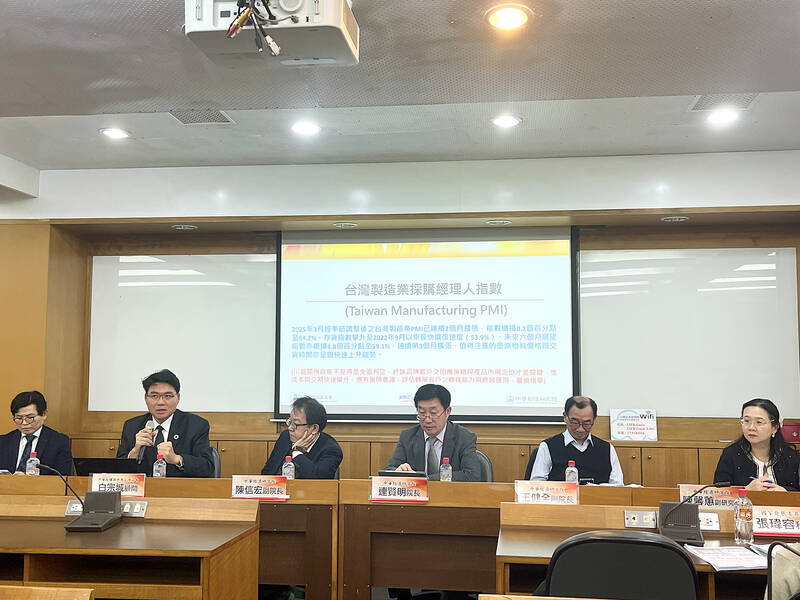Taiwan’s official purchasing managers’ index (PMI) last month rose 0.2 percentage points to 54.2, in a second consecutive month of expansion, thanks to front-loading demand intended to avoid potential US tariff hikes, the Chung-Hua Institution for Economic Research (CIER, 中華經濟研究院) said yesterday.
While short-term demand appeared robust, uncertainties rose due to US President Donald Trump’s unpredictable trade policy, CIER president Lien Hsien-ming (連賢明) told a news conference in Taipei.
Taiwan’s economy this year would be characterized by high-level fluctuations and the volatility would be wilder than most expect, Lien said

Photo: Hsu Tzu-ling, Taipei Times
Demand for electronics, particularly semiconductors, continues to benefit from US technology giants’ effort to develop artificial intelligence applications, but Trump’s unpredictable policy stance casts a shadow over global trade, he said.
PMI data aim to assess the health of the manufacturing industry, with values of more than 50 suggesting expansion and points below the threshold suggesting contraction.
Trump is today expected to introduce reciprocal tariffs, leading businesses around the world to adopt a wait-and-see attitude, Lien said.
The reading on new orders rose 2.4 percentage points to 56.8, the fastest growth since July last year, but short orders accounted for a large chunk and many firms indicated they do not see orders beyond this month, the Taipei-based institute said.
The latest PMI data showed that the inventory subindex gathered 1.2 percentage points to 53.9, the strongest expansion since September 2022, as manufacturers engaged in more active restocking following inventory adjustments in 2023, CIER said.
Local makers also showed more confidence about their business prospects, as the six-month outlook gained 4.8 percentage points to 59.1, the institute said.
CIER researcher Chen Shin-hui (陳馨蕙), who is in charge of the PMI survey, said not all firms hold negative views of US tariffs.
Some Taiwanese firms have benefited from order transfers after Chinese suppliers came under trade restrictions, she said.
However, Academia Sinica fellow Kamhon Kan (簡錦漢) issued a cautionary note, saying that things might take a different turn next month, as Trump could threaten more tariffs, creating more uncertainty about investment destinations, in addition to Mexico and Canada.
Vietnam, a popular investment destination among Taiwanese firms, also ranks high in terms of trade surpluses with the US, Kan said.
“Whatever advantages a destination has today might be gone tomorrow,” he said.
Taiwan’s nonmanufacturing index rose 4.6 percentage points to 53.8, ending a mild contraction in February, the CIER said.
However, service providers have a conservative outlook about business over the next six months, it said.

Hong Kong authorities ramped up sales of the local dollar as the greenback’s slide threatened the foreign-exchange peg. The Hong Kong Monetary Authority (HKMA) sold a record HK$60.5 billion (US$7.8 billion) of the city’s currency, according to an alert sent on its Bloomberg page yesterday in Asia, after it tested the upper end of its trading band. That added to the HK$56.1 billion of sales versus the greenback since Friday. The rapid intervention signals efforts from the city’s authorities to limit the local currency’s moves within its HK$7.75 to HK$7.85 per US dollar trading band. Heavy sales of the local dollar by

Taiwan Semiconductor Manufacturing Co’s (TSMC, 台積電) revenue jumped 48 percent last month, underscoring how electronics firms scrambled to acquire essential components before global tariffs took effect. The main chipmaker for Apple Inc and Nvidia Corp reported monthly sales of NT$349.6 billion (US$11.6 billion). That compares with the average analysts’ estimate for a 38 percent rise in second-quarter revenue. US President Donald Trump’s trade war is prompting economists to retool GDP forecasts worldwide, casting doubt over the outlook for everything from iPhone demand to computing and datacenter construction. However, TSMC — a barometer for global tech spending given its central role in the

The Financial Supervisory Commission (FSC) yesterday met with some of the nation’s largest insurance companies as a skyrocketing New Taiwan dollar piles pressure on their hundreds of billions of dollars in US bond investments. The commission has asked some life insurance firms, among the biggest Asian holders of US debt, to discuss how the rapidly strengthening NT dollar has impacted their operations, people familiar with the matter said. The meeting took place as the NT dollar jumped as much as 5 percent yesterday, its biggest intraday gain in more than three decades. The local currency surged as exporters rushed to

PRESSURE EXPECTED: The appreciation of the NT dollar reflected expectations that Washington would press Taiwan to boost its currency against the US dollar, dealers said Taiwan’s export-oriented semiconductor and auto part manufacturers are expecting their margins to be affected by large foreign exchange losses as the New Taiwan dollar continued to appreciate sharply against the US dollar yesterday. Among major semiconductor manufacturers, ASE Technology Holding Co (日月光), the world’s largest integrated circuit (IC) packaging and testing services provider, said that whenever the NT dollar rises NT$1 against the greenback, its gross margin is cut by about 1.5 percent. The NT dollar traded as strong as NT$29.59 per US dollar before trimming gains to close NT$0.919, or 2.96 percent, higher at NT$30.145 yesterday in Taipei trading